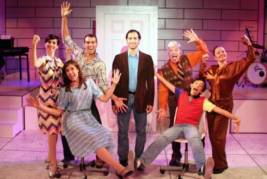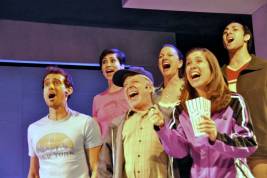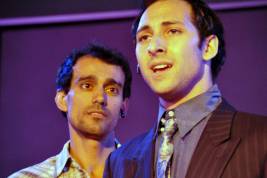
William Finn’s Falsettos has made a rare return visit to Los Angeles in an absolutely splendid production at the brand new Third Street Theatre. To paraphrase one of its songs, “What More Need I Say?”
Falsettos, winner of the 1992 Tony Award for Finn’s songs and for James Lapine’s and Finn’s book, continues the Marvin Saga, begun off-Broadway in Finn’s 1979 one-act In Trousers, and carried on later in 1981’s March Of The Falsettos and 1990’s Falsettoland, the latter two combined to make up Falsetto’s two acts, with a song from In Trousers thrown in for good measure. Got that?
March Of The Falsettos introduces us to Marvin, a 30something New York City professional who has left his wife Trina for a man, Whizzer, news which has sent Trina to see a psychiatrist, Mendel, who also counsels Marvin and the couple’s 12-year-old son Jason. Entirely sung-through, Falsetto’s first act features Finn’s quirky lyrics and melodies (“Four Jews In A Room Bitching”) alongside some gorgeous ballads recalling those of Finn’s Elegies: A Song Cycle. (I defy anyone to sit stone-faced through “Father To Son,” or Act Two’s “What More Can I Say?”, “Unlikely Lovers,” and “What Would I Do?”)
Set in 1979, ten years after Stonewall and two years before the New York Native published the first reports of a “gay cancer” in an article ironically headlined “Disease Rumors Largely Unfounded,” March Of The Falsettos is a bouncy, tuneful, flashy, funny, and occasionally quite moving pre-AIDS look at a Gay-Libbed man and his extended family.
Falsettoland, written well into the AIDS epidemic at a time when an HIV diagnosis was equivalent to a death sentence, turns considerably darker (as might be expected) while retaining much of the first act’s humor … and adding a couple of lesbian next-door neighbors for pizzazz.
Some have complained of a disconnect between the two acts, alleging that Falsettos comes across as two different musicals which happen to feature the same cast of core characters. Though they may be right, it’s actually this “disconnect” that gives Falsettos so much of its power. Act One was written at a time when a case of the clap was about the worst thing that sex could bestow on a gay man, and reflects the naïve optimism of the ‘70s, a heady time where the scourge of AIDS could hardly have been imagined by any of its characters. The characters in Act Two are no longer clueless.
Together the two acts make for as impactful a chamber musical as we’ve seen in the past several decades, filled with so much heart and soul and humor and love that it becomes something quite different from the downer it might be in less skilled hands, particularly as directed at the West Hollywood-Beverly Hills-adjacent Third Street Theatre by StageSceneLA Director Of The Year Richard Israel.
Working alongside scenic designer extraordinaire Kurt Boetcher and lighting design whiz Lisa D. Katz, Israel’s staging is as visually imaginative as it gets, Finn’s songs moving from locale to locale, from mood to mood, Israel and team taking us along on the jouney. Choreographer John Todd shares credit for the show’s visual delights, his contributions ranging from some non-dancey “musical staging” to several honest-to-goodness song-and-dance sequences, most especially a same-sex tango that dazzles. (More on that later.)
Gregory Nabours, the brilliant songwriting talent behind the Scenie Award-winning The Trouble With Words, leads the show’s onstage “teeny tiny band” (Finn’s words, not mine), made up of Nabours on keyboards, Brian Morales on reeds, and Brian Cannady on percussion, providing expert, virtually nonstop backup, voices and instruments mixed expertly by sound designer Ric Perez-Selsky.
Though perhaps a decade or so younger than Marvin, talented USC grad Jesse Einstein’s otherwise perfect fit for the role allows us to suspend disbelief, and regardless of what either actor’s real-life sexual orientation may be, scenes between Einstein and Richard Hellstern, as Whizzer, sizzle with onstage heat, the fictional couple’s romantic chemistry equally palpable. Hellstern’s gorgeous pipes are a show standout, the two men’s tango showing off some expert fancy footwork from both, Hellstern’s backwards leap of faith proving simply breathtaking. Einstein has great father-son rapport with 11-year-old Major Triple Threat (and Broadway Vet) Major Curda as Jason.
Lani Shipman simply couldn’t be better as Trina, power pipes and comedic skills on particularly fine display in the showstopping “I’m Breaking Down,” which Shipman performs while preparing the most inedible “treat” a woman has ever whipped up onstage. Chip Phillips matches Shipman vocally and comedically in a delightfully quirky turn as Mendell.
Joining the above as the “spiky lesbians” from next door are the sensational duo of Kim Reed (as Dr. Charlotte) and Wendy Rosoff (as “Nouvelle Bar Mitzvah Cuisine” caterer Cordelia), the latter hitting the show’s highest notes in her distinctive, crystal-clear soprano belt.
Jessica Olson’s costumes are just-right late ‘70s/early ‘80s creations. Faryl Sahr is stage manager and Nicholas Acciani prop master. Falsettos is produced by Kimberly Harrigan.
AIDS-related deaths in the U.S. may have plummeted in the nearly two decades since Falsettos premiered on Broadway, but the worldwide epidemic is hardly over. Falsettos reminds us how HIV changed the lives of its first victims and does so in the most human (and yes, entertaining) of ways. You’ll laugh, you’ll cry (bring Kleenex), and you may even, like this reviewer make plans to return for more laughter and tears. Yes, indeed, Third Street Theatre’s Falsettos is that stunning a production!
Third Street Theatre, 8115 W. Third Street, West Hollywood.
www.thirdstreettheatre.org
www.showclix.com (search for FALSETTOS)
–Steven Stanley
September 11, 2011
Photos: Yelka Honig, David Elzer





 Since 2007, Steven Stanley's StageSceneLA.com has spotlighted the best in Southern California theater via reviews, interviews, and its annual StageSceneLA Scenies.
Since 2007, Steven Stanley's StageSceneLA.com has spotlighted the best in Southern California theater via reviews, interviews, and its annual StageSceneLA Scenies.







 COPYRIGHT 2024 STEVEN STANLEY :: DESIGN BY
COPYRIGHT 2024 STEVEN STANLEY :: DESIGN BY